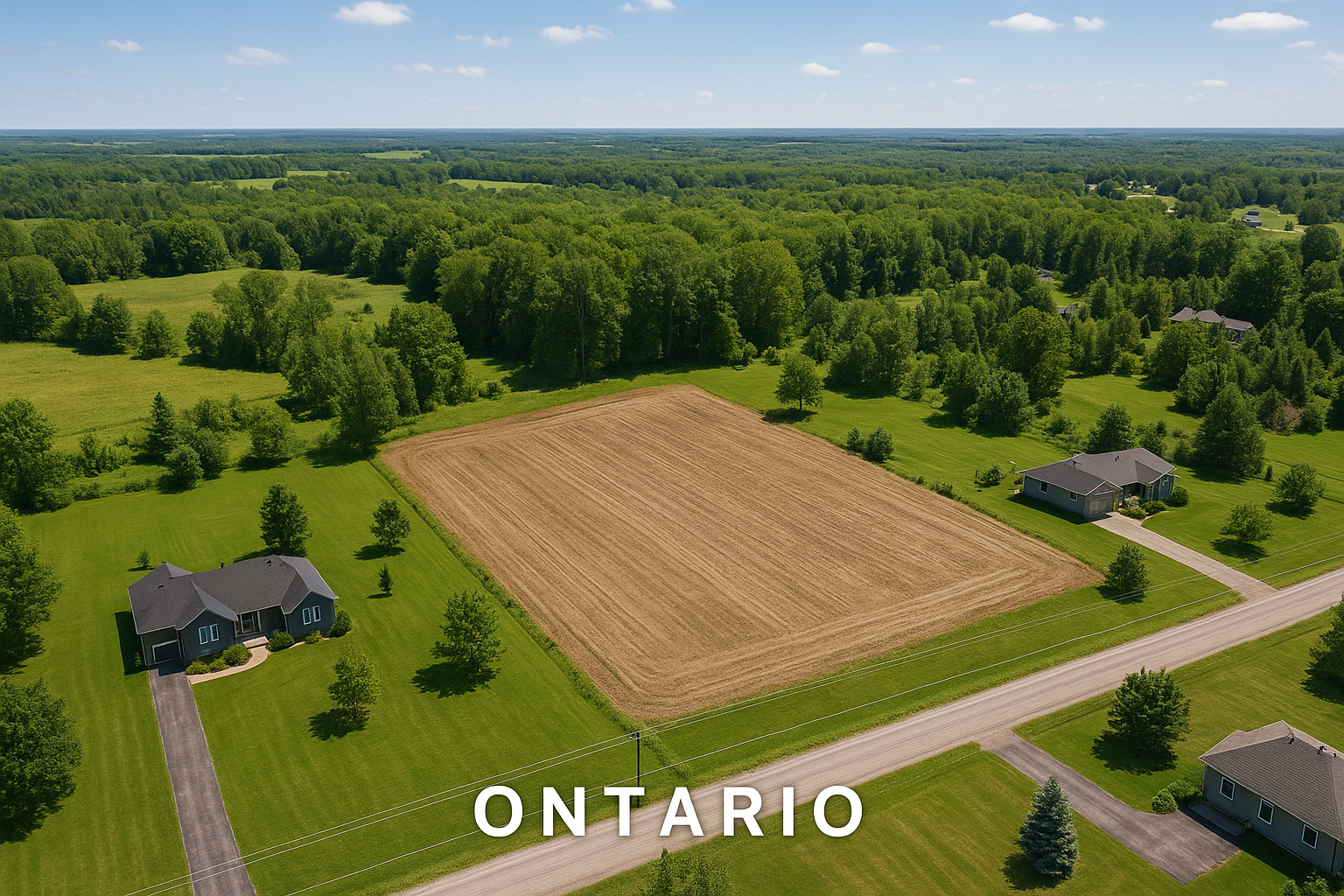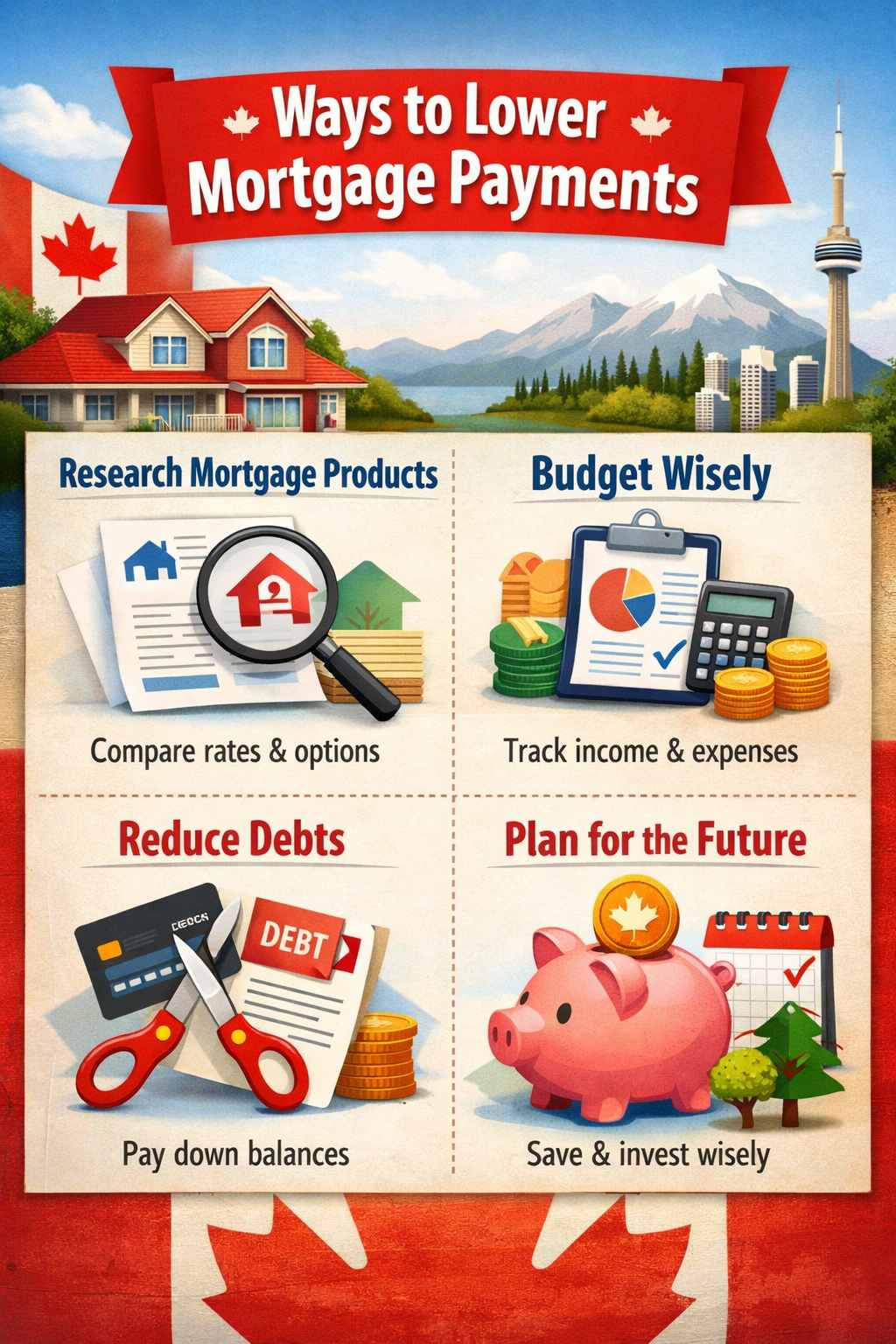Refinancing a land loan in Ontario can open the door to lower interest rates, improved cash flow, or the funds needed to develop or repurpose your property. Unlike a traditional mortgage, a land loan is tied to raw or undeveloped land, which lenders often view as a higher-risk asset. That means refinancing isn’t always straightforward—approval depends on zoning, land size, equity, and the type of lender you approach.
In simple terms: if you own land in Ontario and want to access its equity, lower your borrowing costs, or restructure your debt, refinancing your land loan is one way to do it. But the process comes with unique challenges, from strict loan-to-value (LTV) limits to selective lender criteria.
Key takeaway: A land loan refinance in Ontario is possible, but your success depends heavily on the land’s purpose (residential, commercial, or agricultural) and the lender you choose.
Table of Contents
ToggleUnderstanding Land Loans in Ontario
What is a Land Loan?
A land loan is financing used to purchase or hold land rather than a completed home or building. Unlike a typical mortgage, which is secured against a residential property, a land loan is secured against vacant land, farmland, or property slated for future development. Because there’s no house or income-producing building to secure the loan, lenders often consider land loans riskier.
Types of Land Loans
In Ontario, land loans typically fall into a few categories:
-
Residential Land Loans – For land intended to build a home or future residence.
-
Commercial Land Loans – For business purposes, such as building retail or office space.
-
Agricultural Land Loans – For farmland or acreage used in farming operations.
-
Vacant or Raw Land Loans – For undeveloped land with no immediate construction plans.
Important to note: Each type of land loan comes with different interest rates, equity requirements, and lender guidelines.
Why Land Loans Differ from Traditional Mortgages
A mortgage for a home is backed by the property’s resale value, making it easier for lenders to recover funds if payments stop. With vacant or raw land, resale risk is much higher. For this reason:
-
Loan-to-value (LTV) ratios are often capped lower (50–65% for banks, sometimes higher for private lenders).
-
Interest rates are typically higher than standard mortgages.
-
Fewer lenders are willing to finance or refinance land.
Common mistake: Many borrowers assume refinancing a land loan is just like refinancing a mortgage. In reality, the criteria are stricter, and approval depends more on zoning, acreage, and location than on borrower credit alone.
Why Refinance a Land Loan in Ontario?
Many Ontario landowners consider refinancing a land loan as their property needs or financial circumstances change. While land loans typically carry higher interest rates than standard mortgages, refinancing can help improve affordability and unlock new opportunities.
Lowering Interest Rates
Interest rates on land loans are usually higher due to risk. If you took out a land loan several years ago when rates were even higher, refinancing today could mean reducing your monthly interest costs. Even a small rate drop makes a difference on large acreages or commercial land holdings.
Accessing Equity for Development
If your goal is to build, refinancing can release equity tied up in the land. This capital can fund site servicing, down payments for construction mortgages, or rezoning applications. Developers often rely on land loan refinance as the first step toward turning vacant property into income-generating real estate.
Improving Cash Flow
For landowners carrying multiple debts, a refinance can restructure payments into a single, more manageable plan. Spreading costs over a longer term may reduce monthly obligations and free up cash for other investments or operations.
Consolidating High-Interest Debts
A common reason for refinancing is debt consolidation. By rolling credit cards, personal loans, or other liabilities into a refinanced land loan, borrowers often pay lower rates compared to unsecured credit.
Diversifying Use of Land
Some owners refinance to pivot the land’s purpose—for example, shifting from residential development to commercial use. Refinancing can provide the flexibility needed to pursue new plans without selling the property.
Key takeaway: A land loan refinance in Ontario is not just about lowering costs. It’s about creating financial flexibility—whether for building, farming, rezoning, or debt consolidation. Done right, it transforms a static piece of property into an active part of your financial strategy.
Factors That Affect Land Loan Refinance
Not all land loan refinance applications in Ontario are treated the same. Lenders look at several important factors before deciding whether to approve, decline, or adjust the terms of your refinance request.
Zoning (Residential vs Commercial vs Agricultural)
The zoning of your property plays one of the biggest roles in refinancing eligibility.
-
Residential land loans are generally easier to refinance, particularly if the land is in an urban or suburban area where demand is high.
-
Commercial land loans often carry stricter requirements. Lenders want to see a strong business case for future use or development.
-
Agricultural land loans are common in rural Ontario. While some lenders specialize in farming properties, others may avoid refinancing agricultural land due to fluctuating farm income and resale uncertainty.
Important to note: If land is zoned rural or agricultural, lenders may place limits on how much equity can be refinanced compared to city lots.
Land Size & Acreage
The number of acres attached to the property matters. A one-acre residential lot in Mississauga is far easier to refinance than a 200-acre parcel of farmland in northern Ontario. Larger properties often face tighter loan-to-value (LTV) restrictions because resale becomes harder, and fewer buyers exist for large parcels.
Loan-to-Value (LTV) Ratios
Unlike a traditional mortgage, where you might borrow up to 80% of a home’s value, land loan refinance approvals are usually capped lower.
-
Banks: 50–65% LTV
-
Credit Unions: 55–70% LTV
-
Private Lenders: 50–75% LTV (but at higher rates and higher ltv means lender exceptions)
Key takeaway: The amount of equity you already have in the land will strongly determine whether refinancing is possible.
Borrower Profile
While equity is most important, lenders will still look at your overall profile:
-
Credit score and repayment history
-
Income stability (especially if applying with a bank or credit union)
-
Other outstanding debts
-
Tax arrears or unpaid obligations
Common mistake: Assuming bad credit doesn’t matter for land loan refinancing. While private lenders may prioritize land equity, institutional lenders often decline if the borrower’s credit history is too weak.
How to Qualify for a Land Loan Refinance in Ontario
Refinancing a land loan in Ontario requires more preparation than most people expect. Unlike a standard mortgage, lenders demand extra assurance that the property is marketable, properly zoned, and financially viable. To improve your chances of approval, it’s important to know what lenders look for and how to present your application.
Required Documents
When applying for a land loan refinance, be prepared with:
-
A recent land appraisal confirming market value.
-
Property tax statements showing no arrears.
-
Proof of income and a list of existing debts.
-
Zoning documentation to clarify permitted land use.
-
Mortgage statement (if the land loan is already financed).
Common mistake: Submitting an incomplete application. Missing documents can delay or derail your refinance.
Step-by-Step Process
-
Application – Submit personal, financial, and property details to the lender.
-
Appraisal – The land must be appraised to confirm value and condition.
-
Zoning Confirmation – Lenders verify the land’s zoning classification (residential, commercial, or agricultural).
-
Lender Review – The lender evaluates your equity, credit, and income profile.
-
Approval & Closing – If approved, new financing terms replace the old land loan.
Key takeaway: The process resembles a mortgage refinance, but lender scrutiny is stricter due to higher risk.
Lender Comparison Table
| Lender Type | Typical LTV | Interest Rates | Flexibility | Best For |
|---|---|---|---|---|
| Banks | 50–65% | Lowest | Strict | Strong credit, urban land |
| Credit Unions | 55–70% | Moderate | Medium | Community borrowers, smaller towns |
| Private Lenders | 50–75% | Higher | Flexible | Vacant land, large acres, bad credit |
Checklist – Qualifying for a Land Loan Refinance
✅ Updated land appraisal
✅ Proof of income and debts
✅ Property tax statement
✅ Zoning documentation
✅ Mortgage statement (if applicable)
Important to note: Private lenders may accept applications with weak credit if the equity is strong, but banks and credit unions rarely do.
Challenges and Common Myths About Land Loan Refinance
Refinancing a land loan in Ontario can feel more complicated than refinancing a traditional mortgage. Borrowers often run into unique challenges that aren’t always obvious at the start. Understanding these up front can save time, money, and frustration.
Higher Interest Rates Compared to Mortgages
One of the biggest challenges is that land loans almost always come with higher rates than home mortgages. Lenders see vacant or undeveloped land as a higher risk, so refinancing doesn’t usually bring rates down to standard mortgage levels.
Key takeaway: Even with refinancing, expect your new interest rate to be higher than what you’d pay for a home mortgage.
Limited Lender Appetite
Many banks simply don’t want to refinance land loans—especially for vacant land with no immediate development plan. Borrowers in Ontario often turn to credit unions or private lenders, where approval depends more on equity and zoning than on personal credit.
Important to note: Lenders are more likely to approve refinancing if the land is in a growth corridor (e.g., GTA suburbs) versus remote, rural areas.
Development Restrictions
Even if you want to refinance to fund construction, zoning bylaws and municipal restrictions can stand in the way. Land zoned strictly for agricultural use may not qualify for refinancing into residential or commercial development.
Common mistake: Assuming zoning can be easily changed before refinancing. In Ontario, rezoning is a lengthy process and must usually be completed before lenders will consider a refinance.
Common Myths About Land Loan Refinance
-
Myth 1: “Any land can be refinanced.”
Reality: Land with no road access, servicing, or zoning certainty is often declined. -
Myth 2: “Bad credit doesn’t matter for land loans.”
Reality: While private lenders focus on equity, banks and credit unions still require solid credit. -
Myth 3: “Farmland is always easy to refinance.”
Reality: While Ontario has strong agricultural sectors, lenders still assess farm viability, income, and resale risk. -
Myth 4: “Refinancing guarantees lower payments.”
Reality: Lower payments depend on interest rates, LTV limits, and lender terms—not just refinancing itself.
Alternatives if You Can’t Refinance a Land Loan
Not every borrower will qualify for a land loan refinance in Ontario. Strict lender policies, zoning restrictions, or insufficient equity can make approval difficult. The good news is there are other ways to access funds tied to your land.
Home Equity Loan
If you own both a home and a parcel of land, you may be able to leverage your home’s equity instead. A home equity loan typically offers higher loan-to-value limits and lower interest rates compared to refinancing a land loan directly.
Key takeaway: This option works best if you have significant equity in your primary residence.
Selling Part of the Land
For landowners with large acreage, subdividing and selling part of the property can generate cash flow without a formal refinance. This approach is common in rural Ontario, where farmland or large lots can be split into smaller parcels.
Important to note: Subdivision requires municipal approval and may take time, but it can unlock capital while retaining ownership of a portion of the land.
Joint Venture or Partnerships
Some developers enter partnerships with investors to fund development. Instead of refinancing, you could contribute the land while a partner provides the capital. Profits are then shared once development is complete.
Private Lending as a Short-Term Solution
If banks or credit unions decline, private lenders often step in. While interest rates are higher, private refinancing can provide short-term relief or bridge financing until the land is developed or rezoned.
Common mistake: Waiting too long before exploring alternatives. The sooner you seek advice, the more flexible options you’ll have.
FAQ on Land Loan Refinance in Ontario
Q1: Can I refinance a vacant land loan in Ontario?
A: Yes, but refinancing vacant land is often the most challenging type of land loan. Most major banks avoid financing raw or undeveloped land because there’s no immediate income potential or residential structure to secure the loan. In Ontario, many borrowers turn to private lenders or credit unions for refinancing.
Important to note: Approval usually depends on equity. If you already own more than 35–40% of the land’s value outright, your chances of refinancing improve significantly.
Q2: Do banks in Ontario refinance commercial land loans?
A: Some banks will refinance commercial land loans, but only under specific circumstances. They want to see a strong business plan, development potential, and market demand in the area. For example, land near Toronto or Ottawa zoned for commercial use is more attractive than rural commercial land with limited buyers.
Key takeaway: If your land is commercially zoned, be prepared with documentation—such as rezoning approvals, development permits, or feasibility studies—that demonstrate its future potential.
Q3: How much equity do I need to refinance a land loan?
A: Most lenders require you to have at least 30–40% equity in the property. This means your existing land loan should be no more than 60–70% of the land’s appraised value.
Common mistake: Assuming 80% loan-to-value (LTV) rules for mortgages apply to land loans. In reality, land loan LTVs are much stricter because resale risk is higher.
Q4: Is refinancing farmland different from residential land?
A: Yes, agricultural properties come with their own set of rules. Some lenders specialize in farm financing and offer refinancing tailored for agricultural income streams. However, farmland refinancing in Ontario still depends on acreage size, zoning, and income stability.
Important to note: If farmland is strictly zoned agricultural, lenders may be reluctant to approve refinancing unless you can demonstrate consistent farm revenue.
Q5: Is refinancing farmland different from residential land?
A: Yes, agricultural properties come with their own set of rules. Some lenders specialize in farm financing and offer refinancing tailored for agricultural income streams. However, farmland refinancing in Ontario still depends on acreage size, zoning, and income stability.
Important to note: If farmland is strictly zoned agricultural, lenders may be reluctant to approve refinancing unless you can demonstrate consistent farm revenue.
What Documents Are Required for a Land Loan Refinance?
| Document Type | Purpose |
|---|---|
| Recent Appraisal | Confirms the current market value of the land. |
| Zoning Documentation | Verifies permitted land use through your municipality. |
| Property Tax Statement | Shows no arrears and that taxes are up to date. |
| Proof of Income & Debts | Helps lenders assess repayment ability. |
| Existing Land Loan / Mortgage Statement | Confirms current loan balance and terms. |
Key takeaway: Being organized can speed up the refinance process. Missing or incomplete documents are one of the main reasons applications get delayed or denied.
Key Areas in Ontario Where Land Loan Refinancing Is Common
While land loan refinancing is available across Ontario, some regions see more activity due to higher demand, stronger resale values, and established lender interest.
-
Greater Toronto Area (Toronto, Mississauga, Brampton, Oshawa) – High land demand and development potential make refinancing more accessible.
-
Ottawa & Eastern Ontario – Government, residential, and commercial projects drive refinancing needs.
-
Southwestern Ontario (London, Windsor, Kitchener-Waterloo) – Mixed use: residential subdivisions, agricultural land, and commercial expansion.
-
Northern Ontario (Sudbury, Thunder Bay, North Bay) – Refinancing is available, but lenders are more selective due to resale challenges.
-
Cottage Country (Muskoka, Kawarthas, Georgian Bay) – Strong demand for recreational and residential land loans, often through private lenders.
Important to note: Just because a region isn’t on this list doesn’t mean refinancing isn’t possible. Lenders have unique criteria, so working with a mortgage broker can help match you to the right financing source for your area.
Final Thoughts on Land Loan Refinance in Ontario
Refinancing a land loan in Ontario may seem overwhelming, but it doesn’t have to be. While banks and credit unions can be strict with zoning, acreage, and equity requirements, there are still options available for borrowers who need flexibility. Whether you own residential land ready for development, farmland that’s part of your family’s livelihood, or commercial land waiting for the right project, refinancing can help you lower costs, access equity, or consolidate debt.
The key is understanding that not all lenders view land the same way. If one institution says “no,” it doesn’t mean you’re out of options. Private lenders and specialized mortgage brokers often step in where traditional lenders won’t, creating pathways to keep your plans moving forward.
At LendToday, we work with homeowners and landowners across Ontario to find refinancing solutions that fit unique circumstances. Even if your situation seems difficult, we’ll explore every option to help you move ahead with confidence.
👉 Key takeaway: With the right guidance, a land loan refinance can turn your property into a tool for financial growth, not just an asset sitting idle.
- 7 Great Ways to Reduce Your Mortgage Payments Without Sacrificing Your Goals - January 19, 2026
- Important Factors Mortgage Lenders Use to Determine Your Mortgage Amount - January 14, 2026
- 9 Painful but Smart Options If You Lose Your Job and Can’t Pay Your Mortgage - January 12, 2026






